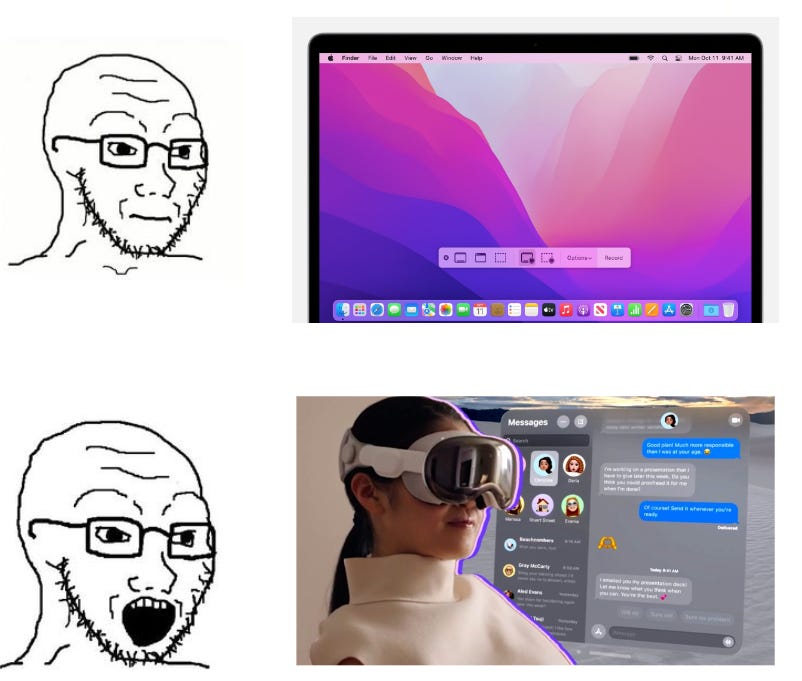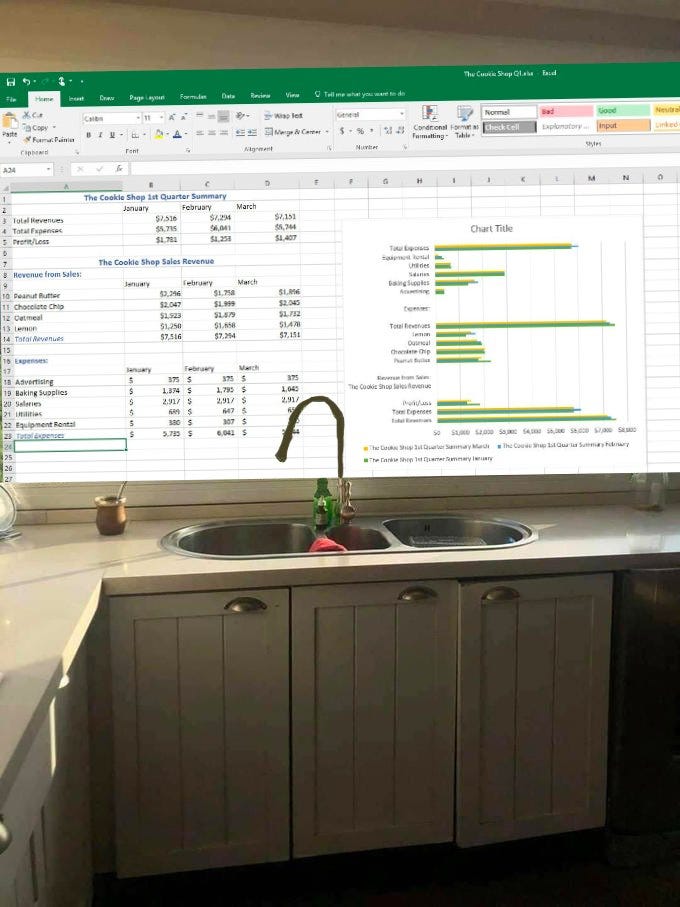Why I'm (still) not buying the VR hype
You're already addicted to your mobile device. What good will come of slipping further away from base reality?

I already wrote how your mobile device is making you anxious/depressed and ruining your creativity. VR will be worse. It’s of course (once again) been hailed as the next big thing, promising to revolutionize the way we work, play, and interact with the world because our current culture is lost and champions novelty over all else. So despite the buzz surrounding this technology, reignited by the Cupertino reality distortion field still trading on Steve’s vision, I find myself perpetually unexcited about its prospects. Some words on why, in no particular order, and about all VR broadly.
Most importantly, the beauty of base reality itself is vastly underrated. In a world filled with distractions, I've recently made a very conscious effort to embrace the richness of the physical space around me. In addition to being sober for over 450 days now, lifting regularly and eating well, I leave work at my workstation and cell phone behind as often as possible. From the simple pleasures of a hike in nature with my dog to the depths of human interaction, I find more than sufficient fulfillment and stimulation in base reality. I am not chasing a high or novelty elsewhere. None of this will be well understood by our amphetamine-addicted culture.
These deliberate choices have not only increased my productivity for work and passion projects without the need for industrial-grade stimulants, they’ve removed majority of the anxiety and depression I was carrying. Why would I want to undo this progress by strapping on a face computer for extended periods? I’d ask anyone constantly seeking more escapism to be metacognitive about what you’re doing. What are you running from? Why?
My normal computer desk with natural light coming in through windows which I spend a significant amount of time at is not something I wish to leave. It has ample screen real estate via multiple monitors well-distanced from my eyes, high quality studio speakers, a mechanical keyboard with tactile feedback that feels good to use, etc. None of this would be made better virtualized, and I can’t imagine being a productive human with a setup they’ve made their own over a decade+ thinking otherwise. Frankly, entering VR every day sounds as dystopian as sitting in 2 hours of traffic (something I’m also not going back to).

The notion of using VR for work strikes me as particularly strange. Sitting for hours with a bulky headset obscuring vision without tactile feedback on all devices, miniaturized microphones and touch-free interfaces hardly seems conducive to a joyful workflow. A mouse is precise and underrated. Give me a physical workstation with multiple screens any day — practicality trumps novelty when it comes to getting things done. The relentless pursuit of ‘what’s next’ in the tech sector often simply prioritizes what’s new and novel over useful innovation and meaningful progress. I appreciate experiments, but the mindset of ‘just one more app or invention will solve all my problems’ is separate from that. Most of the people commenting on ‘VR for work’ don’t even do any deep work all day and just send emails or are talking heads. I’m certain VR seems like a great way to have further control of the herd to them, or at the very least a trend to extract short term value from. But really it’s just moving deck chairs in an annoying way, and does also make you look like a farm animal.

It's worth questioning the motives behind the push for VR in productivity, as VR is inherently a consumption device (not creation). As someone who has written several original albums in my free time, I of all people should be excited at the prospect of a virtual studio to create music in. The problem here goes beyond a heavy headset and eye strain of screens inches from my eyes. That’s bad enough. It’s that audio production like many other crafts is about precision. Dials and knobs to very specific decimal-level settings and keys touched to a specific strength are important. This requires tactile input. Even things like turntable virtualization have been made tactile again through hardware controllers, because they just weren’t fun without them. Laptop DJ’ing is terribly boring for the artist and listener.
And even if I was using these devices while in VR, now I’m just making something enjoyable less so, while being less present by having strange pixels surrounding me, inches from my eyes with my head/neck weighted. It just makes no sense, there’s nothing being solved for. For route learning of something like piano or guitar, I can see it being helpful, but this to me is still more consumption. This aspect is indeed better consumption than just watching movies, as it’s active, but so are video games. The Oculus is at a price point that makes sense for already — these devices are all glorified gaming consoles. The last few % of ‘better’ experience still doesn’t solve the fact that being in VR for very long feels dystopian, solipsistic and frankly depressing. But the latest device has an Apple logo, so people will ham it up. Anyway, even for passive activities: watching a movie or the game on the couch with your friends/spouse is so much better as a shared experience. And even if you’re alone, I’d rather hang out with and pet my dog while being present in the room.
Is VR a genuine desire to enhance our lives and efficiency, or simply a case of tech companies seeking to capitalize on a trend already in motion? Too often, I see individuals succumbing to the allure of novelty without critically evaluating utility. How are spreadsheets while doing dishes better? You’re just making both activities worse. Attention doesn’t work like this.

When you see TV talking heads hyping up tech and venture capitalists who need new trends to make bubble money, the motivations are clear. But let me give another example of how this plays out: in my youth I used to be a gamer, and for years there would be a stream of new expensive input devices that would get progressively better quality. Yet rich kids who purchased these would always be lapped by practiced individuals with a simple keyboard and mouse. If you’re not competent with the simplest of inputs, all the fancy tools in the world won’t help. It annoys some people to no end we might have really good solutions for a lot of things already in place today, you just have to spend the cycles to get proficient with them. I just don’t want us to get distracted here: AI is the real innovation this cycle, and implemented correctly it supersedes the need for immersive computing devices as it ideally frees us for more time away from screens, especially those close to our eyes.
On the new Apple device itself, a quote from the Verge says it well:
That is a lot of tradeoffs — big tradeoffs, not little ones. And the biggest tradeoff of all is that using the Vision Pro is such a lonely experience, regardless of the weird ghost eyes on the front. You’re in there, having experiences all by yourself that no one else can take part in. After using the Vision Pro for a while, I’ve come to agree with what Tim Cook has been saying for so long: headsets are inherently isolating. That’s fine for traditional VR headsets, which have basically turned into single-use game consoles over the past decade, but it’s a lot weirder for a primary computing device.
Their video review is below, watch it if you’re genuinely curious. If you own an Oculus you’ll already understand the drawbacks discussed. These will all be solved with computer-brain interfaces by the way, which instantly sends VR to zero. A few percent better Oculus with eyes doesn’t change this. And I don’t buy that these are AR devices, that’s just marketing-speak: it’s still a face snorkel.
Aside from actual use cases of VR/AR such as training for specific tasks like surgical work, which is great, the fancy new Apple device will mostly just be status-flexing by people with money to do that, but sadly missing what status now means. They want shortcuts to seem hip and cool, and buying the latest gadget is something they’ve been trained to do. It’s for consumer-grade nerds (real nerd flexing is building your own rig, which pure Apple fanboys are further removed from every year). I don’t have a problem at all with Apple devices by the way, and own a recent year Macbook I think is fine. I just don’t drink the kool-aid of any company and have had strong opinions on devices and how we engage with computing since the 90s. I stood in line for an iPhone gen 1, was so excited for it. You couldn’t pay me to do that here.
Beyond any novelty of a new device, the discomfort of wearing VR for extended periods and absurd appearances, there are deeper concerns about the impact on our sense of self and connection to reality. Are we willing to trade genuine human experiences for pixelated simulations? Do we want to forgo tactile feedback? Why such a desire to hide from natural light and our current physical settings?
In summary, people are hype about face computers that rich nerds will shell out $3K for, and those who'd worship a toaster if it was made by Cupertino are going to keep saying ‘it's the future’ nebulously (the future of what, they don't know). Be careful reading thoughts from those who when Apple says jump, they always say ‘how high.’ And if you really want to spend all day alone looking through a reality snorkel, well, have fun with that. Just please try and touch real grass at some point, too.





VR glasses are like the 1963 Chrysler Turbine Car.https://en.wikipedia.org/wiki/Chrysler_Turbine_Car
It's like, aerospace engineers build jets, so why not cars too?! When one only one has a hammer (transistors), every thing looks like a nail.
Real life and Black Mirror are converging every year. Apple is almost like Supreme: slap a logo on it and sell it for big bucks. And I say this as someone who uses a MacBook Pro, iPhone and iPad.